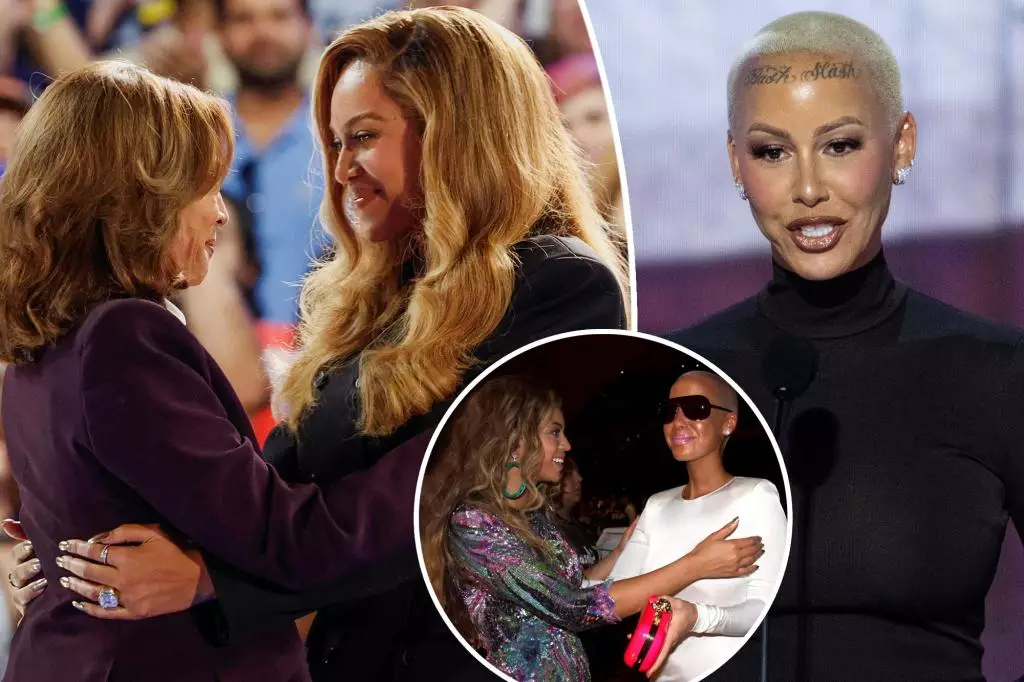In today’s digital landscape, social media has a unique capacity to amplify voices, making even the smallest comment echo across the globe. One poignant example of this phenomenon is the recent backlash faced by Amber Rose following her remarks about Beyoncé at Kamala Harris’s rally in Houston. Rose, known for her vibrant personality and controversial statements, ignited widespread conversation when she suggested that Beyoncé had “taken” her speech format. This assertion, stemming from Rose’s earlier comments at the Republican National Convention, snowballed into a media frenzy, highlighting how quickly perceptions can shift in the age of instant communication.
In a world where celebrity interactions often feel meticulously curated, Amber Rose’s admission that she was “literally trolling” places her in a complex narrative. Responding to questions posed by media representatives while attending a Halloween celebration, she expressed surprise at the international attention her comment garnered. The underlying humor in her statement captures a certain degree of self-awareness; however, it also points to a broader misunderstanding of the weight words carry, especially when one occupies a public platform.
When discussing influential figures like Beyoncé, it’s important to remember the public’s perception extends beyond the superficial. Beyoncé, who has long been a figure of empowerment and cultural significance, chose to endorse Kamala Harris not merely as a celebrity but as a mother concerned for the future. Her speech, which emphasized a need for unity and collective action, starkly contrasts with Rose’s self-referential comments, revealing a divergence in how each addresses their respective audiences.
Rose’s tendency to instigate controversy begs the question: is she capitalizing on moments for self-promotion? Her assertion that Beyoncé “wants to be her” blurs the lines separating confidence from delusion and raises eyebrows among fans. The online backlash — ranging from uproarious laughter to biting critique — serves as a testament to how quickly public opinion can shift and how celebrities can become the subject of ridicule when perceived as out of touch.
This incident is not merely about Amber Rose or Beyoncé; it illustrates the intricate dynamics of social media as a platform for raising issues, marketing agendas, and sparking discourse. Rose’s comments, posted on Instagram, leveraged the immediacy of social media to gain attention but also exposed her to spontaneous backlash. This scenario brilliantly encapsulates the double-edged sword of social media where personal expression can bolster fame but can also lead to fierce scrutiny for making imprudent remarks.
Furthermore, the reactions from the public reflect underlying societal sentiments regarding motherhood and empowerment. The comments dismissing Rose’s remarks pointedly illustrate the societal elevation of Beyoncé. The differences in how both women navigate their roles as mothers in the public eye raise profound questions about legacy, authenticity, and celebrity culture. Many users articulated a fundamental distinction: Beyoncé’s cultural resonance as a multifaceted talent as opposed to Rose’s positioning as a polarizing figure, leading to an entertaining yet serious investigation into how public personas are cemented or dismantled in public discourse.
In today’s celebrity-driven culture, discussions surrounding figures like Beyoncé and Amber Rose inevitably touch on broader issues, such as political endorsement and collaboration among artists. Beyoncé’s speech at Harris’s rally implored listeners to recognize their agency in a political landscape that increasingly demands civic engagement. In contrast, Rose’s declarations juxtapose a personal narrative against an urgent social call to action. This dichotomy exemplifies divergent approaches to discourse and influence, prompting us to reconsider how celebrities exercise their platforms.
Ultimately, the Amber Rose and Beyoncé incident epitomizes the complexities of fame, identity, and accountability in an interconnected world. Observing how public narratives unfold offers valuable insights into the interplay between personal expression, social expectations, and cultural significance. As individuals navigate the world of celebrity, a heightened awareness of the impact of words, especially on such prominent platforms, becomes paramount. The incident serves as a reminder that in the relentless pursuit of attention, the lines between humor, sincerity, and respect can become increasingly blurred.

